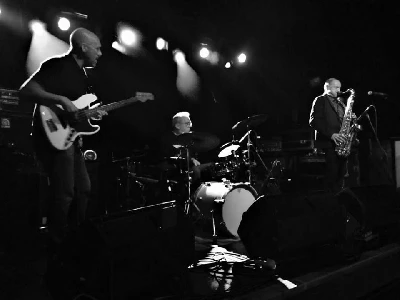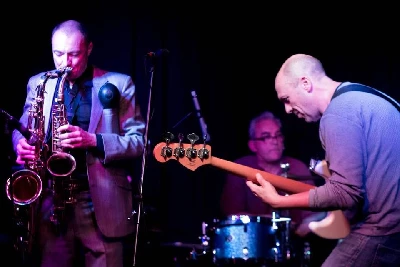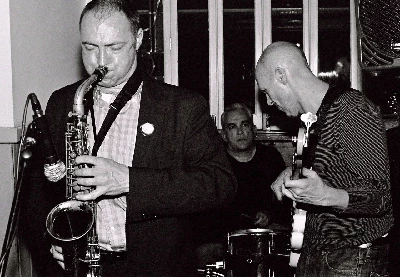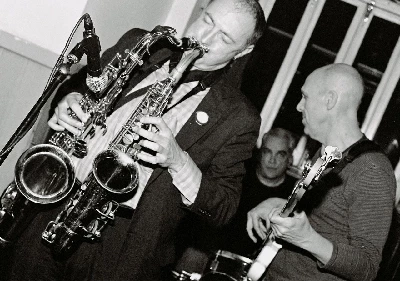published: 1 /
2 /
2025

Fiona Hutchings talks to Mark Bedford and Terry Edwards about their limited-edition RSD release, 'The Character Actor EP', and much more besides.
Article
Near Jazz Experience are Mark Bedford, Terry Edwards, and Simon Charterton. Mark Bedford is most widely known for being the bassist in Madness for over 40 years. Terry Edwards, on horns, is a well-respected session musician who has played alongside a raft of artists from P J Harvey to Frank Ferdinand. Rounding out the trio is former Higsons drummer Simon Charteton.
While their recent RSD release is an EP, the cast of musicians packs a double album-sized punch, including pianist Mike Garson, who played a on a few minor league albums (Aladdin Sane and Diamond Dogs) for a little-known artist called David Bowie. As Edwards and Garson had previously worked together, Terry asked if Mike would like to play on a track. In the space of 24 hours Garson had recorded a ‘stupendous solo’ for Character Actor in his home studio and sent it over.
Rounding out the players is keyboardist ‘Dollboy’ Oliver Cherer, who plays with Miki Berenyi currently, who brings his skills to two tracks.
If the title track makes me think of busy, gritty streets and the hustle of making a living, The Loping Four has got something of sleazy nod and wink to it. MacGuffin is a fascinating one – and not just because the word was a Hitchcock term for a red-herring. I love the track and equally don’t trust it at all, and the seductive horn just adds to that feeling. This isn’t a four-hour film that’s baffling because it thinks it will win an Oscar on that basis, it’s a two-hour film that needs you to pay attention, but will reward you handsomely for doing so.
I was lucky enough to talk to Mark Bedford and Terry Edwards about the making of the record and a lot more besides.
PB: The last NJE RSD release, Nought to 60, was in 2021. Is RSD becoming a bit of a habit?
MB: I think it's more that we had this particular track. We had Mike Garson, and it seemed such a waste not to use his whole complete piano track. We’d asked him if he'd play on the track, and we thought he'd listen to the arrangement and maybe play a bit around it and we’d take it from there. But actually, he delivered from the very first to the very last note and didn't stop playing the whole way through. We’d already started our recording on the track itself, but we just had to give people the full version that he played. RSD is the option that presented itself and we thought it was worth releasing it.
PB: I really liked it, even though jazz is not normally my thing. Then again, I bought a Butterfield 8 record a long time ago, well before the internet was there to educate me, because your face, Mark, was on the front cover. I expected a Madness offshoot, got it home, put it on and went, okay, that's not quite what I was expecting.
MB: Some of the Butterfield 8 stuff the publisher wasn't expecting either!
TE: It’s a very different world to when we both started making records. How you could put records out and the amount of time you have to create music - it’s all changed. The internet is a bit of a blank page, and blank pages are very difficult to work with. But we like the idea of being able to dedicate a whole side of a physical record to that piece because Mike just took it somewhere it hadn't been.
We could have taken out the full version, the band version of it, and we could have actually made it shorter, to make it more single-like or more radio-friendly. But it's nice to be able to, I don't know, just get it into that filmic space where something can carry on for a few minutes and really engage you and take you away. It gives you the option to experience and indulge in art in a new way.
PB: So how do you compare this to the sort of things you were releasing a lot earlier in your careers? Does it feel like you have got more scope to go and do different projects?
MB: It’s a nice thing to run in parallel with our other work. As Terry was saying, it allows us to stretch out a little bit more, to not worry about getting everything under three minutes or whatever. We think about working in a totally different way, you know, when we work with the NJE. We're still in the business of trying to make things memorable.
It’s nice to be a bit more relaxed. Instead of thinking lyrically, and that you've got to have one event after another on a record, here we can stretch out. You think a bit more in sounds.
PB: I’m guessing that as you've not got lyrics that you've got to match those sounds to, it can just be about how it sounds? More about the overall picture music paints and not being very tied down to the standard kind of pop song length.
MB: Yep. They're not completely unrelated because we use what we know about pop music, but we use it differently in NJE. We are still looking for hooks but in a different way.
TE: I think you can be bolder instrumentally than you would be with a lyrical song. When I’m working as a session musician, doing horn arrangements etc on songs, the golden rule is to kind of stay out of the way of the vocal. When you do instrumental music, the way that we do it, is you can do really bold things, but something still has to be the lead vocal. Somebody has to be the lead singer and if it happens to be the effect on the bass at that particular point in the instrumental then you whack that up to lead singer volume. It makes you create this piece of music where it just so happens that the vocal doesn't have a voice, for want of a better phrase.
PB: That makes a lot of sense. It sounds like NJE, being a much smaller group, provides quite a different creative experience for you both. Not having a lot of bodies around making decisions, having opinions, that kind of thing?
(They both laugh.)
MB: Yes, it is. Just by sheer numbers obviously, there's only three of us and we play almost everything so, yes, it's easier in that respect.
TE: The loudest voice always wins!
MB: There's a lot of voting.
TE: The individual votes don't take so long because there are a few of these.
MB: Yes. There aren't any recounts in the NJE! I mean, it is different, we record in a different way. In Madness we record in a very traditional way. We rehearse the song, we record a backing track and then all the overdubs go on and because we've got one of everything, instrument wise, there are lots of overdubs. In NJE we put down the backing track, but then we start layering it up. It takes a lot more time though because we do this in between our other projects. This means we come back to tracks quite a lot and work on it over time.
PB: I've always had the impression that this is more of a passion project than anything else?
MB: Yeah, very much so. As Terry has said in the past, the idea when we first started out was to literally turn up, take the instruments out of the case and set off, just see where it all goes.
When we play live, we keep the same themes of the songs, but we might drift off into other things or we might play them in a slightly different way. We might change it up, the tempo might be a little bit different. Obviously in Madness, and when Terry is doing sessions, playing pop music, then you've got the song and you've got to play it from start to finish. In NJE we have that luxury of being able to follow where it just naturally goes sometimes, the joy of improvisation.
TE: Also, we're all quite aware that if you're in a place that holds 10,000 people, you don't have that same thing as if you're in a boozer with 80 people where you see the whites of everyone's eyes and you have a conversation with the audience. Our tunes are open-ended, whereas if you are playing Wings of a Dove or something, it's always going to be that length, and there's nothing wrong with any of these things.
PB: It’s adapting to your audiences, then? It sounds like you get something from doing both types of music and it's not about one being ‘better’.
MB: Yes, they can both coexist quite easily together you know. You just shift your thinking a bit about how you do it. With Madness we are always aware that people pay a lot of money to come to these shows and obviously they want to hear certain songs, which is right. So that's why we play what they want to hear, and we don't do 15 minutes of poetry or, you know, this is my new kind of concept album.
TE: Actually Mark, I was really hoping we'd get poetry in somewhere…
(They both laugh.)
PB: There is an album coming after the EP too. Do you know when that album's likely to be out?
MB: It's there, it's ready, we just need to pick our moment to put it out.
There is also the question these days of figuring out how we're going to put it out, but it will certainly appear online at the very least. Then there’s the secondary issue of getting publicity around a release which is so important these days as well.
TE: And music had a longer lifetime in the old chart days, you could have a record in the top ten for more than a week. Now you must pick your timing, the way you do things, because although you'll have the back catalogue there forever, the actual awareness of a tune will be five minutes long.
PB: When the last Madness album, C'est La Vie, became your first number one last year, so many people were surprised because they assumed you must have had a number one previously.
MB: We were surprised as well! I think there have been Madness compilations that have been to number one, but it was the first studio album. I think the Taylor Swift fans just had an off day just at the right time and didn't buy or download hundreds of thousands of versions of Taylor Swift's album and I think we just snuck in at the last minute.
PB: Do you feel like your combined fan bases translate into more interest in NJE?
MB: I don't think it makes a huge difference. I don't think there's a huge crossover really.
TE: The name of Madness, and some of the people I work with, gets you a foot in the door and that's fair enough. It's the backhanded consequence of the people coming along to see NJE not knowing what they're going to get and being pleasantly surprised!
PB: Does it feel like people are more open now to listening to different types of music?
MB: Maybe, but it can only be in passing. There is so much to hear. You can think of any record and type it into Spotify, and it will appear. So that's a very wide field. When we first started, there was a lot less out there so you could bring new music to the attention of people a lot easier.
TE: Although NJE don’t do pop or vocal music it's not difficult to listen to. There’s a very funky, accessible beat behind us with, straight away thanks to Simon. People come to hear us the first time and can relax. This isn't difficult jazz; this isn't people noodling away. It is good time music and maybe not what they expected.
MB: Yeah, that's a very good point. Sometimes the word jazz scares people. But we are more groove-based than anything else. NJE all started because we were playing in Terry’s local pub. It started just as that, that we'd set up a groove going and then just play, we’d see where it'd go from there.
TE: I always say NJE wasn't meant to be the name of the band - I just put it on the poster to not frighten people away. I put that it’s ‘a Near Jazz Experience’ and then it became the band name, for better or worse!
MB: Doing it for RSD is great. You really get into the spirit of what record store day is actually about. You’re playing in an independent record shop, people are out for the day, people want to buy, and they've got their eyes on certain things.
TE: The releases that I’ve put out on Sartorial for RSD Day have always been in the spirit of RSD. Taking the idea that you're not just doing a reissue in a different colour vinyl or something. That it's either new music or maybe something that has never ever been on vinyl before, that should be what it's about. This one in particular has tracks that aren't going to be on the album, aside from Character Actor, the band version itself. The others are specifically for this EP. I always want to get my records signed by someone if I see them, that sort of thing. I think that spirit's always followed us through as a band with RSD. We want to do it for the right reasons.
PB: Terry, you wrote the 33 1/3 book about the album One Step Beyond.
TE: Yeah, that was a pretty good experience, all in all, doing that book. We tried to explore how bands get together. It means there's history involved as well, so there is a chronology.
PB: I think it works because you're looking at the record, aren't you? Some of the books in the series I’ve read have been a lot drier.
MB: Yeah, there are quite a few academic ones.
TE: I wanted to do it as if I was talking to somebody and enthusing about the album in a pub!
PB: I wondered if either of you had thought about writing more about your own musical careers?
TE: I have a few stop-start versions of the autobiography. It's like putting out music, trying to figure out how you do it, how do you write about it? I have been reading a lot of biographies and autobiographies just to get a handle on it all. I think that one of the driest things is to do it chronologically. If you're very interested in, say, Michael Caine or Nick Cave, do you really want to know about their grandparents and where they came from? I can understand academically how that might be interesting, but this struck me when I had a book of Bobby Keyes who was the sax player with the Rolling Stones. He did the solos on Brown Sugar and all that stuff and toured with the band. I read it from cover to cover and lent it to James Johnston from Gallon Drunk. He immediately dived right into the middle bit, where Keyes is on smack in the bathroom of the house owned by bloke who started Playboy. I thought maybe if you're interested in that person, it’s because of those kinds of stories. That's kind of where I'm at with my own book. I have done quite a bit of writing about these things, but I’m still thinking about how to make it interesting. How to present it to someone is something to think about long and hard first.
PB: What about you, Mark?
MB: I’m pretty sure that I wouldn't write a traditional book that goes I was born, I grew up, I played music and now I'm quite old. That’s a very short book! I would probably take an angle. I believe there should be kind of a generosity amongst musicians and things should be handed on. I would maybe write something like that - not necessarily my career, but maybe my experiences. I’d want to use those experiences and pass that on. Something I'd also be particularly interested in, is the mental side of playing and performance. There are very few natural performers, so everyone has their own way of getting up there and playing. I’d also explore going through that rigmarole, learning lots of songs and then having to perform them. That side interests me and that would be something maybe that I could explore.
What also interests me about music books is that sometimes you get four people at the same event and invariably they each interpret that event differently. You know everyone puts themselves at the centre of the drama, and that interests me as well. The idea that maybe you take one event and then you get all the participants to just look at that one event and put their side of the story. They'll just be wildly different most of the time.
TE: When I did the Madness book, I wanted to interview everybody in the band individually. I did this and I was interviewing Suggs around the corner from where they were recording at the time and Clive Langer came in the pub towards the end of the interview. Then they started bantering between each other and you knew that the stories were getting further from the truth! It was definitely the right decision getting everyone individually.
I remember there was a compilation of Sex Pistols stuff. It might have been one of the first ones that was on CD and the band did the sleeve notes thing. I don't think any members of the band were talking to each other at this point, so they all contributed their own sleeve notes. There was one song, Pretty Vacant, where Glen Matlock said, ‘Oh this was inspired by SOS, by ABBA’. And the next note was Steve Jones writing ‘Glen always went on about ABBA with this song. I couldn't hear it myself.’ Things like that I thought were really funny. We nicked that idea for a Higsons' compilation of BBC sessions because this had just come out. I thought why don't we just write what we remember of that time and then let somebody else - it might even have been you, Mark - collate these bits of information. I think it's a good way of looking at things through many pairs of eyes.
Character Actor by The Near Jazz Experience was released as a limited edition for Record Store Day on 20 April 2024. There will be 500 copies on black vinyl available.
Madness – One Step Beyond by Terry Edwards can be bought from all good bookshops.
Band Links:-
http://thenje.co.uk/
https://twitter.com/The_NJE
https://www.facebook.com/NearJazzExper
Play in YouTube:-
Picture Gallery:-


